There’s a particular video that’s been circulating across football social media for some time, and if you haven’t seen it yet, you should. It shows Adam Wharton warming up before Crystal Palace’s match at Everton, alone on the pitch, ball at his feet, head constantly swivelling as he dribbles around imaginary opponents. He’s visualising patterns, anticipating movements, practising the art of scanning that seems so natural to him that it’s almost instinctive.
👀 @CPFC‘s Adam Wharton is always watching… pic.twitter.com/h0jF9WQkhI
— Premier League (@premierleague) October 10, 2025
A couple of hours after that warm-up routine, Palace’s club-record 19-game unbeaten run ended with a 2-1 defeat. Jack Grealish scored the winner for Everton but sounded almost apologetic when receiving the man-of-the-match award. “That should have gone to Adam Wharton,” Grealish admitted. “He was the best player on the pitch.”
Yet when Thomas Tuchel named his England squad days later, Wharton was nowhere to be found. Not even on a substitutes bench that included 35-year-old Jordan Henderson and Ruben Loftus-Cheek, making his first appearance for his country in nearly seven years. The omission raises uncomfortable questions about whether English football truly values what Wharton offers- or whether old prejudices about physicality still trump technical brilliance.
The “Too Weak” Narrative
This isn’t the first time Wharton’s exceptional ability with the ball has been overshadowed by concerns about his physical profile. During his teenage years at Blackburn Rovers, scouts and managers would visit Ewood Park, watch the skinny kid with the buzz cut and rolled-down socks, and conclude: “Not the one for us.”

The feedback was brutally reductive: “Champions League with the ball, Conference League without it.” It’s the kind of narrow thinking that typifies how football’s talent evaluation industry operates; focusing obsessively on what a player cannot do rather than celebrating what they can do exceptionally well.
Tony Mowbray, Wharton’s former Blackburn manager, has a different perspective. He calls Wharton “a genius.”
Mowbray’s assistant Mark Venus used to marvel during training sessions when Wharton was still a schoolboy. In an interview earlier this year, Mowbray recalled Venus coming into the office after sessions asking: “Just so I’m not going daft, who was the best player in training today?” Mowbray would laugh: “I know, I know, but you can’t put him in the team when he’s just 15!” Venus would then compare the teenager to Paul Scholes, as reported by Stuart James.
The Other Side of the Modern Midfielder
Wharton is everything defensive midfielders supposedly shouldn’t be in modern football. He doesn’t sit deep recycling possession with safe sideways passes. He doesn’t obsess over maintaining shape. Playing conservatively inside his own half simply isn’t his thing, and that’s precisely what makes him so fascinating to watch.
Consider how he escaped pressure against Everton. As Iliman Ndiaye closed him down on the touchline, Wharton faked one direction, came back the other, leaving the Everton midfielder stranded in a different postal code. Then, instead of taking the obvious pass to Daichi Kamada, he slid a reverse ball through to Ismaila Sarr that sliced through the opposition.
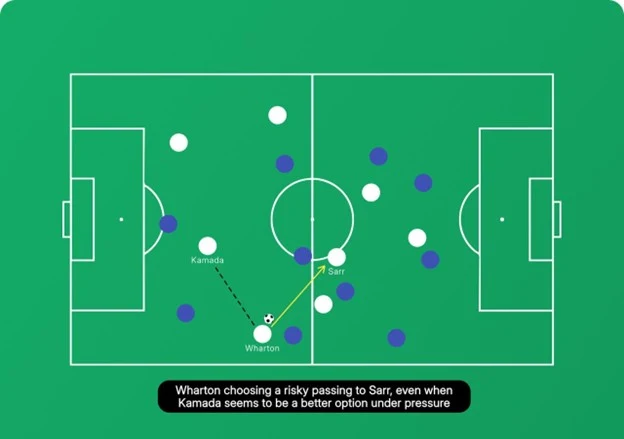
That sequence encapsulates Wharton’s philosophy. “I can play a game and get 100% success if I pass it to my centre-backs and full-backs every time,” he told The Times last season. “But anybody can do that. Every professional footballer can pass it side to side for 90 minutes. If you can play forward, I don’t see why you wouldn’t.”
The Danger of Data Without Context
Analysing Wharton purely through spreadsheets, without context, produces absurd conclusions. One prominent football statistics website recently listed passing as among Wharton’s weaknesses; a bit like suggesting Harry Kane needs shooting practice or Bukayo Saka should improve his left foot.
Wharton is an exceptional passer. But he attempts passes that make a difference- incisive, around-the-corner, eye-of-the-needle deliveries that carry inherent risk. Those passes don’t always connect, which tanks his completion percentages on data sheets. But when they do connect, they’re dangerous.
Against Liverpool recently, Wharton attempted a pass early in the second half that registered as incomplete statistically. In reality, it was a gem that nearly put Jean-Philippe Mateta through on goal. Mateta, raising his hand afterwards to acknowledge the quality, had simply been caught slightly on his heels. Liverpool’s defence and midfield were floundering.
Midfield magic from Adam Wharton 🪄 pic.twitter.com/l3IxB9Ksr7
— Crystal Palace F.C. (@CPFC) October 9, 2025
Left-Footed Magic
Being naturally left-footed and forward-thinking opens passing angles that disrupt opposition presses and completely change attacking rhythm. Against West Ham, Wharton let the ball run across his body inside his own half before fizzing a pass into Yeremy Pino’s feet, eliminating the entire West Ham midfield in one stroke.
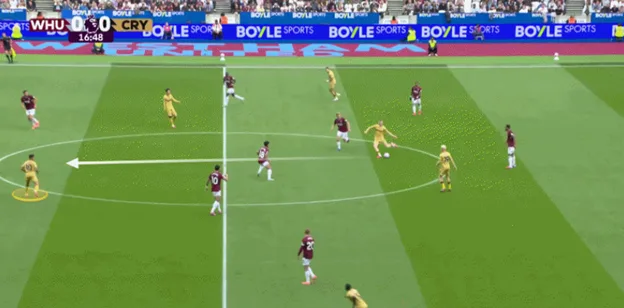
He repeated the pattern less than two minutes earlier, higher up the pitch, striking the ball with disguise and pace. It’s a trademark Wharton delivery, and brings to mind something he said years ago at Blackburn: “This might sound weird, but I love rapping passes through to the No 10, so they can turn and drive at the defence- maybe more than a goal or an assist. Because I was a No. 10 myself, I can appreciate how difficult those passes are to make, but also how valuable they can be.”, added Stuart James in his piece.
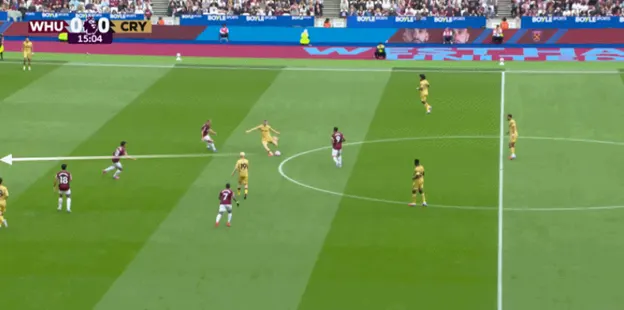
Intelligence Over Athleticism
Palace’s recent clip against Chelsea showcased another dimension of Wharton’s game. Receiving in a pocket of space inside Chelsea’s half, he turned beautifully, played a crisp one-two with Sarr that allowed him to glide away from Moises Caicedo, then fed Mateta with one of those passes you never see coming until the ball arrives at its destination.
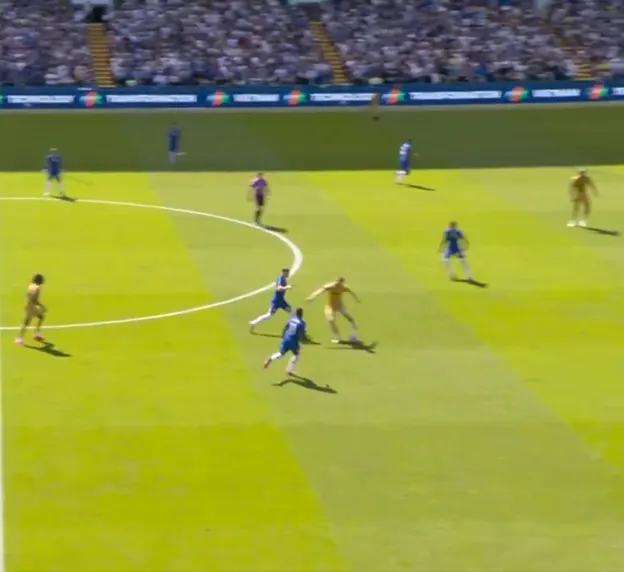
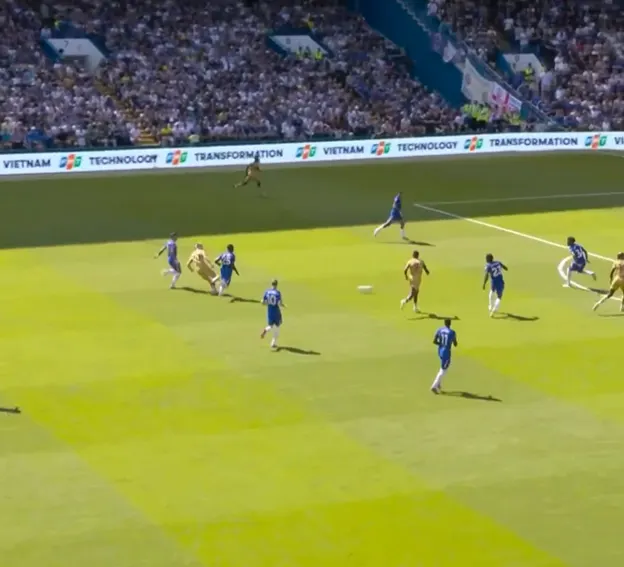
The key to Wharton’s effectiveness isn’t physical- it’s cognitive. He constantly scans, “taking pictures” as Mowbray describes it, gathering information about his surroundings before the ball arrives. That allows him to play predominantly one or two-touch football, making it extraordinarily difficult to press him effectively.
Data from SkillCorner reveals that around 61% of Wharton’s passes are either first-time or “quick” (released in under a second after receiving). That rapid decision-making, combined with his ability to scan, means opposition midfielders are perpetually a step behind.
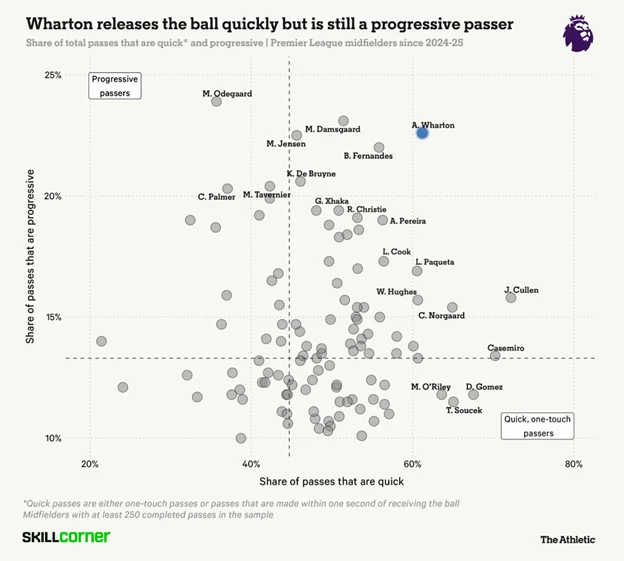
The England Question
Tuchel claimed Wharton “deserves to be with us” when announcing his squad, suggesting the 21-year-old was simply unlucky. Wharton himself was philosophical, noting the break would let him visit his grandparents and that “it’s not the end of the world as there’s another camp next month.”
But there’s a concerning undercurrent here. Does Tuchel question whether Wharton is physically dynamic enough? Can he run? Does his lack of athleticism count against him?
If so, it represents a troubling return to outdated thinking- the same prejudice that caused scouts to dismiss a teenage Wharton at Blackburn. Worrying about what a player cannot do exceptionally well, rather than maximising what they can do brilliantly, is how football squanders generational talent.
Steve Parish regarding Adam Wharton’s future, “I think at some point Adam will want to play in the Champions League with us, if we can make that happen, or possibly with another club. He’s an extraordinary talent, and I believe he’s very committed to the club.” @henrywinter
The Takeaway
Watching Wharton play feels like witnessing football from a different era, one where intelligence trumped physicality, where vision mattered more than pressing statistics, where a perfectly weighted pass was valued as highly as a lung-busting run. He’s a throwback disguised as a modern player, someone who’d have thrived alongside Scholes, Xavi, or Pirlo but somehow feels out of place in today’s obsession with athletic profiles. Here’s what frustrates me most: we’ve spent years bewailing England’s lack of technically gifted midfielders who can unlock defences with a single pass, yet when one emerges, scanning constantly, playing through lines, creating chances others don’t even see, we question whether he runs enough. It’s maddening. We’re essentially saying we’d rather have someone who covers more ground doing less important things than someone who covers less ground doing everything that matters.
Wharton represents a choice English football needs to make. Do we continue chasing the mythical complete midfielder who ticks every physical box but lacks the rare gift of seeing football in slow motion? Or do we build around the exceptional talents we actually have, even if they don’t fit the traditional mold?
Palace understand what they’ve got. Opponents are starting to realise it too, hence Grealish’s post-match honesty about who really deserved that award. The only people seemingly unconvinced are those selecting England squads. If Tuchel and future England managers can’t find room for a left-footed playmaker who dismantles defences with his passing, who plays the game at a different tempo than everyone else, who makes his teammates better simply by existing in the same midfield- then England will continue wondering why they can’t control big matches when it matters most.
The answer will be warming up at Selhurst Park, head up, always watching, while they’re looking elsewhere.


